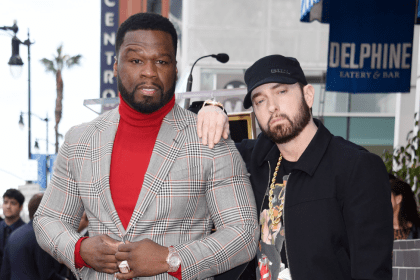
Story by Todd Williams, Gavin Philip Godfrey, DeWayne Rogers, and Jason Thompso
n Contributed to the StoryImages by Amir Shaw and Michael Melendy for Steed Media Service
That was the proclamation from defense attorney Dwight Thomas, as he exited the Richard B. Russell Federal Courthouse in Atlanta on Friday, October 19, 2007, after U.S. Magistrate Judge Alan Baverman decreed that his client, multiplatinum rap superstar, Clifford “T.I.” Harris would not be allowed any immediate release on bond. The rapper is facing federal weapons charges after he was arrested in a sting at a Midtown Atlanta parking lot, just hours before he was set to perform at the 2007 BET Awards. Authorities have alleged that Harris provided $12,000 to his bodyguard to buy weapons. Harris was convicted on felony drug charges in 1998 and, as such, is not allowed to own the weapons. Instead of performing at the event and being honored for his musical contributions; the superstar was booked and detained, with his car and College Park home being searched by federal authorities. At his home, six other guns, five of which were loaded, were found in his bedroom closet. T.I.’s longtime on-and-off girlfriend, Tamika “Tiny” Cottle (formerly of the girl-group Xscape) was also arrested for possession of marijuana and ecstasy pills.
According to ATF documents, the investigation started after the rapper’s bodyguard asked a gun dealer at The Gun Store about purchasing a machine gun without registering it — which is against the law. The dealer reported the incident to the ATF, who started an investigation and provided a fake cell phone number to an undercover agent posing as a gun dealer. On October 10, Harris called the bodyguard who was to pick up $12,000 to buy the weapons. The bodyguard then met with the undercover agent at a K-Mart in Doraville, Ga. T.I.’s bodyguard then gave the agent $2,200 and a .223-caliber pistol in exchange for three 9mm machine guns and two 9mm silencers; after which federal agents arrested the bodyguard. The bodyguard quickly revealed the purchases were for T.I. and that he had purchased approximately 25 firearms over the past 18 months on T.I.’s behalf. While the Second Amendment prohibits Congress or any other government agency from infringing on “the right of the people to keep and bear arms,” the 1968 Gun Control Act that was proposed after the assassination of President John F. Kennedy, and passed swiftly after the assassinations of Rev. Martin Luther King Jr., and Sen. Robert Kennedy.The act prohibited, among other things, the sale of firearms to convicted felons.
The Legal Perspective
Defense attorney Ed Garland spoke to reporters after the bond hearing on the 19th. “This judge has not made a decision,” said Garland. “This matter is under consideration by the court and no one knows what the outcome is going to be.” That cloud of uncertainty hangs over the entire case, with a lone rapper sitting in the center of the storm. Defense attorney Steve Sadow added, “[Harris] wants to move forward in this case. He would like to gain his release if we can meet the conditions the court imposes, and then we’ll deal with the defense once we’ve gotten him out, if we’re fortunate.”
Hip-Hoppers Offer Support … and Advice
The hip-hop community isn’t unfamiliar with its biggest stars crossing paths with the law, but T.I.’s arrest has brought some sobering reality to artists who often find the line between loyalty and legality blurry, and who, oftentimes, face very real dangers because of past associations. “In a situation where you’re very successful, famous and rich, it’s important to keep good people around you and stay true to yourself and walk a righteous path,” says Atlanta-based DJ Drama. “[T.I.] is my big homie. He’s always done right by me every time I’ve been around him. I’m gonna hold him down to the end. It’s not the first time someone has struggled and it’s not something [he] can’t overcome.”
T.I.’s co-star in American Gangster, Chicago MC Common, offered encouragement and gave the self-proclaimed “King of the South” the benefit of the doubt. “I don’t know what happened, but I know that T.I. is smart and that he has a whole life in front of him,” Common said. “So he ain’t doing that kind of stuff — trying to get guns. I don’t believe that. So I just send my love and prayers for him.”
Superproducer RZA, also featured in the film, had some words of wisdom for the younger hip-hop star and the entire hip-hop generation. “You gotta watch what you do, watch what you say. Remember that ‘everything you say can and will be used against you,’ ” said the Wu-Tang Clan founder. … I’d like to send out a prayer to him, a blessing to him. And I hope that things turn out well.”
“It’s one thing to talk about the conditions [in] which we live and say we’re ‘keeping it real,’ but hell — is that the way you want to continue to live? Is that the reality that you want or do you want something better for yourself and better for your people? Well, how will you get something better if you don’t raise [people’s] consciousness to aspire for something better? The artist is the most important person – you are the teachers. People listen to you – they don’t listen to their preachers. The preacher’s day is done; If he’s not a part of the revolution, he is finished. Young people in the streets are not listening to the preachers…”
Min. Louis Farrakhan, speaking on the influence of hip-hop
click to view this photogallery
inside the courtroom:
“I’m concerned about that sort of dichotomy.”
They were all there. In a federal courtroom, Clifford Harris Jr. shared laughs with his trusted attorney, Dwight Thomas, while nervously scratching his face and eyeing his prosecutors. In the front row behind Harris sat his longtime business partner and manager, Jason Geter, flanked by Atlantic and Warner Music Group execs, Julie Greenwald, Lyor Cohen, Kevin Liles, Craig Kallman and Chris Hicks. Immediately behind the corporate giants, Harris’ girlfriend, Tameka “Tiny” Cottle, sat on the end of the second row with Harris’ aunts, uncles and mother — all of them anxiously anticipating the start of the proceedings. As much as they wanted to be in good spirits, there was no shaking the looming shadow of uncertainty, which lay in the future of their son, lover and business associate.
They had heard everything that Harris had up to that point. As Assistant U.S. Attorney Todd Alley spent almost half an hour listing Harris’ extensive rap sheet from 1997-2003, his skin seemed to turn more and more red with each offense announced. Alley and his team would go on to to call Harris’ new charges, “crimes of violence,” as he said there was no way to deny, “The inevitability of what could happen with machine guns and silencers.”
To counter the prosecution’s depiction of Harris, Attorney Steve Sadow would admit, “It would be foolish of us not to acknowledge violations, felonies and misdemeanors,” but that minus a traffic violation in December, 2004 that his client had managed to stay away from jail and his career as a musician and Atlanta community steward had flourished since then.
Following a brief recess, the tension in the room became palpable as Judge Baverman returned to his seat. “Mr. Harris is an exceptionally-gifted and talented individual.” Baverman also acknowledged that the rapper had been “exceptionally generous and has reached out to the community, particularly the community of the underprivileged — with great generosity.” But Baverman also noted that “on the day that is probably the most important of his professional career, he shows up armed at a gun deal. I’m really, really concerned about that sort of dichotomy.”
For those who missed Baverman’s proclamation in the flurry of show-boating music executives, and kids outside the courtroom passing out “Free T.I.P.,” T-shirts, the judge reiterated: “His characteristics are noteworthy,” he said. “But I would be blind not to recognize some of the lyrics of some of the songs that stand as contradiction of what he says to schoolchildren.” Much of T.I.’s appeal is derived from duality: the contrasting image of T.I. — the businessman, entertainer and philanthropist; and T.I.P. — the snarling, guntoting street soldier. As he exited the courtroom, Harris turned to his family and friends, clinching his fist and pumping it into the air; one has to wonder if T.I.P. would be the biggest threat to T.I.’s freedom.
DISCOGRAPHY
Since his auspicious 2001 debut, I’m Serious, Clifford “T.I.” Harris has worn his very real ties to the streets like a badge of honor. But were his lyrics merely a form of artistic expression or a foreshadowing of his current demise? You be the judge.
——————————————————————————–
Still Ain’t Forgave Myself
Album: I’m Serious (2001)
Mistakes made on this road to wealth/
I still ain’t forgave myself/
Ay, what I am today/
I made myself but I still ain’t forgave myself/
For runnin to the grave getting closer to death/
I still ain’t forgave myself/
Be Better Than Me
Album: Trap Muzik (2003)
Shawty, the streets ain’t the place to be/
I’m telling you cuz it’s too late for me/
Ay be betta than me/
Crack a slug/nuttin betta to see than
young ni**az wit a felony sheet/
So be betta than me/
Prayin For Help
Album: Urban Legend (2004)
Man I’m prayin’ fo help/
While I lookin at the life I left/
It’s kinda hard not to hate myself/
But quiet is kept/
Right or wrong it’s just tha way I felt/
I might be better off prayin’ for death/
On my knees I knelt/
Still tryin’ ta find a way ta except/
That ain’t a way/
I can help nobody till I save myself/
I’m Talking To You
Album: King (2006)
Ay I’m the best you ever heard about/
fresher than you heard about/
yeah I’m strapped now …/
this ain’t just word of mouth/
for ni**az wit dirty mouths/
I got a lotta clean pistols to wash ‘em out/
Hurt
Album: T.I. vs. T.I.P. (2007)
I aint scared of the law, naw
I’ma bout to go to war, what it is ni**a,
win lose or draw
I never get caught murkin y’all, cuz it
ain’t wat you do
The question is who saw?











